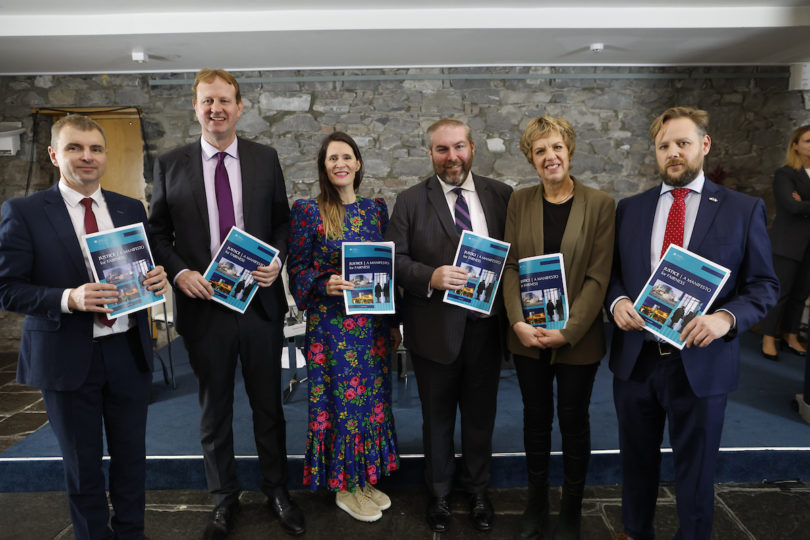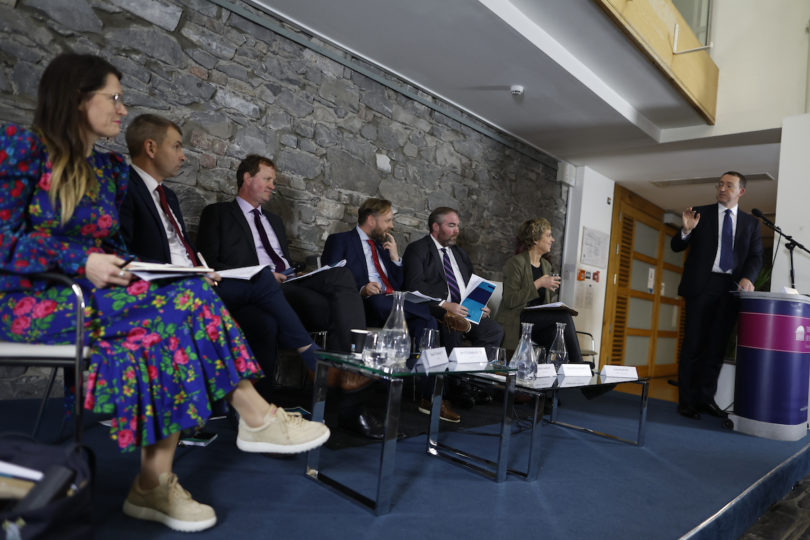
What justice priorities have the political parties outlined in their manifestos?
In this article, explore a comprehensive summary of each major party’s stance on justice.
Assessing Parties’ Justice Priorities
With less than a week until the 2024 General Election, Ireland’s public discourse has been dominated by political canvasing and policy commitments as parties battle to secure votes for election. Central to this discourse are the recently published political party manifestos, which outline their priorities for the next government in the hopes of gaining the support of the public, industry leaders and other public stakeholders.
On the other side of the metaphorical coin, many of these civil society groups have put forward their own sector-specific priorities for the incoming Government. The Bar of Ireland is among them, weighing in as a prominent voice in legal advocacy.
Justice | A Manifesto for Fairness
On the 12th of November 2024, The Bar of Ireland facilitated a fireside discussion with six general election candidates, moderated by Chair of the Bar Council. The event also saw the launch of The Bar of Ireland’s own manifesto: Justice | A Manifesto for Fairness.
Questions directed to the candidates were guided by key priorities such as the need for a fairer justice system for all, regardless of means, pointing in particular to the areas of civil legal aid, family law and criminal justice; and the importance of a fast system, meaning that judicial and dispute resolution systems are delivered efficiently and effectively and of course properly resourced. In addition, The Bar drew attention to areas of potential law reform relating to third-party funding and class actions.
Political Party Manifestos | A Case for Justice
With only days remaining, what do the candidates’ own political party manifestos promise for the future of Ireland’s justice system and where do these priorities align with those set out by The Bar of Ireland?

An overview of each party’s justice priorities as presented in their manifestos is outlined below.
Fine Gael
- Appoint 20 new judges in the first year and establish a judicial training institute.
- Complete the Family Law Court complex at Hammond Lane and establish a new Family Court system.
- Digitise court processes, reform legal aid, and introduce fee guidelines for civil litigation.
- Conduct a comprehensive review of the criminal justice system to cut delays and waiting times.
- Include “Voice of the Child” and welfare reports in family law proceedings.
- Amend the Defamation Act and strengthen the Criminal Assets Bureau with expanded powers.
Read more from their manifesto here.
Fianna Fáil
- Implement the Defamation Bill within three months of taking office.
- Reform civil procedures to reduce delays and costs. o Establish a Chief Coroner and modernise the Coroner’s Court.
- Ensure the timely construction of a new, standalone Family Law and Children’s Court Complex to better serve families and children.
- Reform civil procedure rules to reduce delays and costs in civil proceedings.
- Carry out major reform of District Court practices to free judges from administrative matters.
- Increase the number of specialist courts to handle complex cases more effectively.
Read more here.
Labour
- Resource the Courts Service to handle increased cases, collect data and publish reports on the outcome of cases.
- Reform defamation laws to protect against SLAPPs while retaining juries for defamation cases.
- Support alternative dispute resolution methods, including a Mediation Council.
- Continue to invest in the criminal legal aid scheme and restore the link to public service pay agreements.
- Expand the civil legal aid scheme to more areas and increase the financial eligibility criteria.
- Review the impact of reforms in recent years to the legal services sector, widen access to legal education.
- Invest in the delivery of modern infrastructure and the digitalisation of processes including the use of virtual hearings, a real time list of scheduled cases and begin rollout of a paperless Courts Service.
- Address delays in criminal, civil, and family courts by increasing judicial and staffing resources.
- Reform the Special Criminal Court and replace the Offences Against the State Act.
Read more here.
Sinn Féin
- Increase funding for the Courts Service, Office of the Director of Public Prosecutions, and Legal Aid.
- Invest in services and initiatives to improve the functioning of elements of the Justice system.
- Enhance legal aid access and raise the legal aid income threshold for domestic violence cases.
Read more here.
Social Democrats
- Resource and implement the Family Law Reform Strategy and the Family Justice Strategy.
- Increase funding to the Department of Justice’s Legal Aid Board, to ensure free legal aid is available throughout the processing of international protection applications.
- Adequately fund the Civil Legal Aid Scheme. o Use the findings of the Civil Legal Aid Review Group to inform how best to provide services on the basis of need and how to structure the financial means test.
- Recognise that a properly functioning and accessible court service is essential in providing access to justice. Conduct a full review of existing facilities and allocate an appropriate budget to build the dedicated Family Law and Children’s Court.
Read more here.
The Green Party
- Implement the recommendations of the Judicial Planning Working Group to hire more judges and court registrars to drive down delays and cases being heard.
- Accelerate the modernisation and digitalisation of the courts service, particularly their proposed move away from paper-based processes.
- Increase income thresholds for accessing Civil Legal Aid and expand the areas of law which qualify for it.
- Protect and enhance Criminal Legal Aid.
Read more here.
Additional Manifestos
Additional manifestos from other political parties can be found below:
Conclusion
By their very nature, manifestos are promissory notes to the electorate. As a result, they can lack detail and specificity. Such a tendency calls on all organisations like The Bar to monitor and engage closely with future government parties in the delivery of their promises.
Regardless of the outcome following the 29th of November, The Bar of Ireland looks forward to working with political parties and independents on any future Programme for Government to ensure Ireland’s justice system remains fair, accessible, and equipped to meet the evolving needs of the society it serves.
